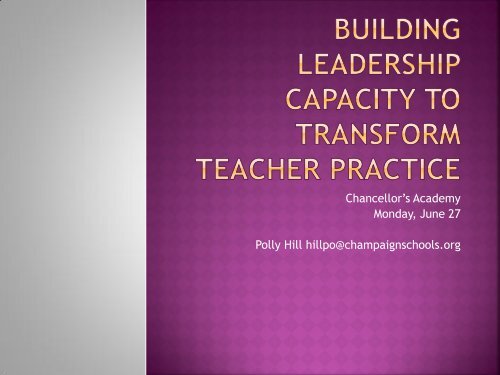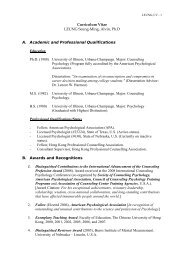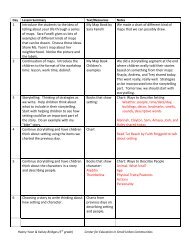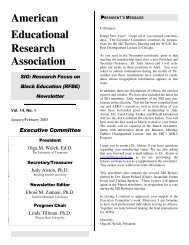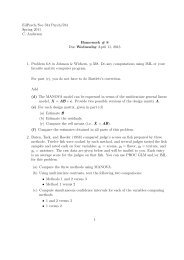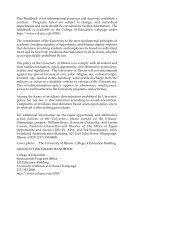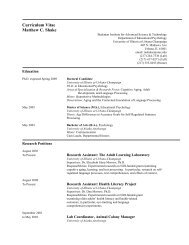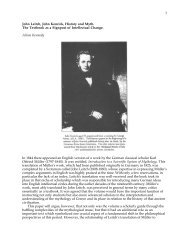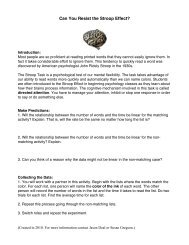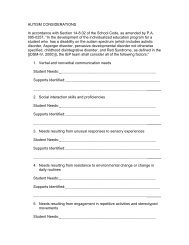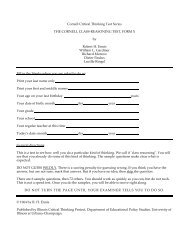Building Leadership Capacity to Transform Teacher Practice (pdf)
Building Leadership Capacity to Transform Teacher Practice (pdf)
Building Leadership Capacity to Transform Teacher Practice (pdf)
Create successful ePaper yourself
Turn your PDF publications into a flip-book with our unique Google optimized e-Paper software.
Chancellor’s Academy<br />
Monday, June 27<br />
Polly Hill hillpo@champaignschools.org
“When you put your<br />
knowledge in a circle, it’s<br />
not yours anymore, it’s<br />
shared by everyone.”
Arrange group in<strong>to</strong> a circle – what is said in<br />
the circle stays in the circle<br />
Whoever has the talking object has the floor<br />
– all other participants are <strong>to</strong> listen<br />
respectfully, no interruptions, no pick ups on<br />
what someone else has said.<br />
Gentle signal by facilita<strong>to</strong>r <strong>to</strong> ensure one<br />
person doesn’t speak “overlong”<br />
Everyone has the option of passing the<br />
talking object if they don’t want <strong>to</strong> speak<br />
No one leaves the circle until it is closed
Who are you<br />
What are you hoping <strong>to</strong> get out of this week
Understand the roles a coach / instructional<br />
leader can have in school setting<br />
Understand the role rapport, paraphrasing<br />
and pausing play in building trust<br />
Understand the elements of the coaching<br />
cycle<br />
Understand the role of data in transforming<br />
teaching practice<br />
Plan for two coaching cycles
Talking Circle<br />
Brains<strong>to</strong>rming Activity<br />
Jigsaw Reading from Taking the Lead<br />
Trust building <strong>to</strong>ols<br />
• Rapport<br />
• Pausing<br />
• Paraphrasing<br />
Pairs Rehearsal<br />
Read / Journal<br />
Homework / Closure
Private think time – brains<strong>to</strong>rm the roles you<br />
think are important <strong>to</strong> a coach instructional/<br />
leader<br />
Table Talk – Share your ideas using the Go-<br />
Around Pro<strong>to</strong>col and choose <strong>to</strong>p three roles<br />
from your table<br />
Put on sentence strips and post<br />
Group Discussion
Count off 1-6<br />
Stack “n” Pack<br />
Silently read your assigned role<br />
Discuss with your group<br />
Create a poster <strong>to</strong> share out <strong>to</strong> group<br />
description of your assigned role
1. Resource provider – chapter 2<br />
2. Data Coach – chapter 3<br />
3. Curriculum Specialist – chapter 4<br />
4. Instructional specialist – chapter 5<br />
5. Men<strong>to</strong>r – chapter 7<br />
6. Learning Facilita<strong>to</strong>r – chapter 8
How does what you’ve heard<br />
so far connect with what you<br />
already knew about<br />
instructional leader/<br />
coaching roles
Rapport<br />
Paraphrasing<br />
Pausing
Trust is over time.<br />
Rapport is in the<br />
moment.
posture<br />
Gesture<br />
Tonality<br />
Language<br />
Breathing
I am listening<br />
I am interested / I care<br />
I understand you (or am trying <strong>to</strong>)
Attend fully<br />
Listen with the intention <strong>to</strong> understand<br />
Capture the essence of the message<br />
Reflect the essence of voice <strong>to</strong>ne and gesture<br />
Make the paraphrase shorter than the<br />
original statement<br />
Paraphrase before asking a question<br />
Use the pronoun “you” instead of “I.”
Mary Budd Rowe found incorporating pausing<br />
of between 3 and 5 seconds brought about<br />
higher student achievement and more<br />
thoughtful responses.<br />
• After the coach ask a question<br />
• After the coachee responds<br />
• Before the coach responds
Work in pairs<br />
Partner A talks about his/her vision of being<br />
an instructional leader / coach<br />
Partner B paraphrases what A is saying while<br />
also using elements of rapport and pausing<br />
Switch roles
Read<br />
What I believe about <strong>Leadership</strong> Development by<br />
Dennis Sparks<br />
<strong>Building</strong> Sustainable <strong>Leadership</strong> <strong>Capacity</strong><br />
Corwin Press<br />
Look for opportunities <strong>to</strong> practice rapport<br />
paraphrasing and pausing
Journal Important Moments 1
Chancellor’s Academy<br />
Tuesday, June 28<br />
Polly Hill hillpo@champaignschools.org
Partner with someone you make eye contact<br />
with from another table<br />
Partner A discusses the reading from last night :<br />
What I believe about <strong>Leadership</strong> Development by<br />
Dennis Sparks<br />
At the signal, partner B continues the discussion<br />
about the reading without repeating anything<br />
At the signal partner A continues<br />
At the signal partner B concludes
What were<br />
some of your<br />
experiences<br />
with …<br />
2008 Center for Cognitive Coaching
Understand the steps involved in conducting<br />
a coaching cycle<br />
• Pre-conference<br />
• Observation<br />
• Post-conference
Reading on Coaching Cycle<br />
Video of Coaching Cycle<br />
Discussing Video
Working in partners, silently read and<br />
highlight the first section of the article<br />
At the end of the section turn and comment<br />
on the content with your table partner<br />
Continue this process for the rest of the<br />
article
Post-conference<br />
reflection<br />
Preconference/<br />
planning the<br />
lesson<br />
Observation /<br />
Co-teaching
What did you notice<br />
about the coach<br />
What did you notice<br />
about the coachee<br />
coach<br />
coachee
2008 Center for Cognitive Coaching<br />
Journal your<br />
from <strong>to</strong>day.<br />
Share with your table group.
Read<br />
• Coaching Heavy and Coaching Light by Joellen<br />
Killion<br />
• When Nice Won’t Suffice: Honest discourse is key<br />
<strong>to</strong> shifting school culture by Elisa MacDonald<br />
Learning Forward - formerly National Staff<br />
Development Council (NSDC)
Chancellor’s Academy<br />
Thursday, June 30<br />
Polly Hill hillpo@champaignschools.org
Stand up and mix with colleagues<br />
On signal Freeze and pair with nearest<br />
colleague<br />
Discuss last nights reading assignments<br />
On signal, repeat mix-freeze-pair
Deepen understanding of the pre-conference<br />
step in the coaching cycle<br />
Understand the role of data as an instrument of<br />
change in teacher practice
Agenda<br />
Welcome<br />
Heavy coaching/<br />
light coaching<br />
Today’s outcomes<br />
Deepen<br />
understanding of<br />
Pre-conference<br />
stage of cycle<br />
• Pairs Rehearsal<br />
• The role of data<br />
• Homework<br />
/Closure
Post-conference<br />
reflection<br />
Pre-conference/<br />
planning the<br />
lesson<br />
Observation /<br />
Co-teaching
Lesson goals<br />
Lesson plan and design<br />
Students’ relevant prior knowledge<br />
Relationship between the nature of the task and<br />
the activity on one hand and lesson goals on the<br />
other hand<br />
Strategies for students <strong>to</strong> make public their<br />
thinking and understanding<br />
Evidence of students understanding and learning<br />
Planning for students’ difficulties, confusions,<br />
and misunderstanding<br />
Strategies <strong>to</strong> foster relevant student discussion<br />
• Lucy West Content-Focused Coaching pg. 13
Clarify Goals of lesson<br />
Specify success indica<strong>to</strong>rs and a plan for<br />
collecting evidence<br />
Anticipate approaches, strategies, decisions, and<br />
how <strong>to</strong> moni<strong>to</strong>r them<br />
Establish personal learning focus<br />
Reflect on the coaching process<br />
Center for Cognitive Coaching
<strong>Practice</strong> a planning conversation where<br />
partner A is the coach and B is planning<br />
Switch roles
What are you learning<br />
about yourself as a coach/<br />
instructional leader
Reading pro<strong>to</strong>col
Write a personal goal about<br />
how you will use data in your<br />
work as a coach / instructional<br />
leader<br />
2005 Center for Cognitive Coaching, PO Box 260860,<br />
Highlands Ranch, CO 80126 44
Read<br />
• <strong>Transform</strong>ing the Demonstration Lesson<br />
Moments in Mathematics Coaching: Improving K-5<br />
Instruction by Kristine Reed Woleck Corwin Press<br />
Resources from Taking the Lead CD<br />
Demonstration Lesson Planning Pro<strong>to</strong>col Tool 6.1<br />
Demonstration lesson observation notes Tool 6.2<br />
Co-teaching planning and debriefing template Tool 6.3<br />
Pre-observation map Tool 6.4<br />
Reflective Feedback pro<strong>to</strong>col 6.5
Chancellor’s Academy<br />
Thursday, June 29<br />
Polly Hill hillpo@champaignschools.org
Chalk Talk Pro<strong>to</strong>col:<br />
Compare the focus of a demonstration<br />
lesson <strong>to</strong> a coaching cycle<br />
When might you choose a<br />
demonstration lesson over an<br />
observation cycle
Know when <strong>to</strong> choose a demonstration lesson<br />
verses a coaching cycle <strong>to</strong> improve teacher<br />
practice<br />
Deepen understanding of the postconference<br />
/ reflection stage of the coaching<br />
cycle<br />
Plan for two coaching cycles - or one<br />
coaching cycle and one demonstration lesson
Agenda<br />
Chalk talk<br />
Post-conference /<br />
reflection cycle<br />
• Planning for<br />
school year<br />
• Talking circle<br />
• Closure<br />
Model/ Paired<br />
rehearsal
Prompts for Reflection<br />
• What are your thoughts about the lesson<br />
• What pleased you / what surprised you<br />
Examining Lesson Artifacts<br />
• Student work<br />
• Scripts of teacher-student dialogue<br />
• Other data collected around the lesson<br />
Analysis of Teaching and Learning<br />
• At what point in the lesson were students learning the<br />
most Why<br />
Implications for the Future<br />
• How will this influence <strong>to</strong>morrow’s lesson<br />
• What will you do differently next time you teach this<br />
lesson<br />
Moment in Mathematics Coaching
Tell me about the highlights of your lesson.<br />
How was this lesson different than what you planned<br />
What do you think accounted for those differences<br />
What evidence from the lesson tells you if your students<br />
achieved the lesson’s goal<br />
<strong>Teacher</strong>s make many decisions as they teach. What<br />
decisions did you find yourself making during the lesson<br />
How did you arrive at those decisions<br />
What did you learn that you will apply <strong>to</strong> a future lesson<br />
Taking the Lead <strong>to</strong>ol 6.5
Rapport<br />
Pausing<br />
Paraphrasing<br />
Inquiring<br />
Probing<br />
Extending by making data available
Plan for two coaching cycles<br />
Or<br />
One coaching cycle and one demonstration<br />
lesson<br />
As a group – select date <strong>to</strong> come back<br />
<strong>to</strong>gether and share our successes/challenges
What did you get out of this<br />
week
To achieve greatness:<br />
Start where you are,<br />
Use what you have,<br />
Do what you can.<br />
- Arthur Ashe


